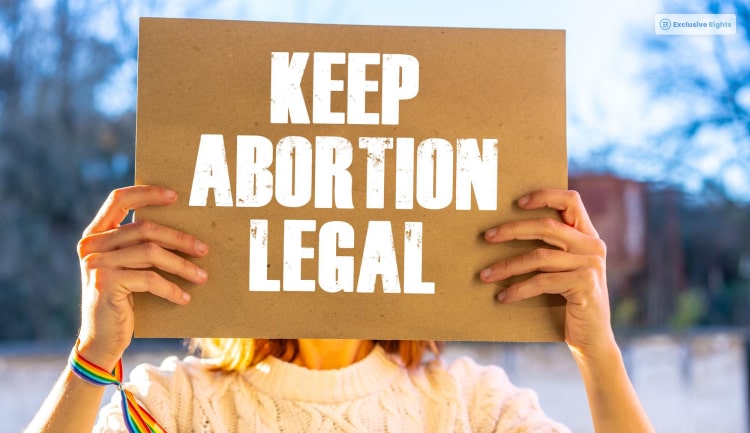
Table Of Contents
- Is Abortion Illegal In The US?
- Roe v. Wade: The Landmark Decision
- Trimester Framework: Balancing Rights
- First Trimester:
- Second Trimester:
- Third Trimester:
- State-Level Variation: The Patchwork of Laws
- Planned Parenthood v. Casey: A Reaffirmation
- Recent Challenges and Changes
- Supreme Court Decisions: Shaping the Landscape
- Safe and Legal Access
- The States That Has Banned Abortion In The US
- States That Bar Abortion Through Gestational Limit
- Are There States In The US That Have Blocked The Abortion Ban?
- States In the US Where Abortion Is Legal And Protected By State Laws
- Final Thoughts
All About Abortion In The US
Abortion has been a heated topic in the history of the US.
Most Americans hold conflicting views on the concept of abortion. And the procedure of abortion has been a morally conflicted topic in the States.
American women have fought a long and hard battle to acquire their reproductive rights, which include the right to abortion.
In this article, we will discuss the abortion laws that are prevalent in the United States.
Is Abortion Illegal In The US?

Abortion is a topic that stirs passionate debates and raises numerous questions. Is it legal in the USA? Moreover, The short answer is yes, but let’s delve into the details of this complex and evolving issue in an engaging and conversational manner.
Roe v. Wade: The Landmark Decision
The foundation of abortion law in the United States is the 1973 Supreme Court decision in Roe v. Wade. Moreover, This case ruled that a woman has the constitutional right to choose to have an abortion, thanks to the right to privacy.
Trimester Framework: Balancing Rights
The decision in Roe v. Wade established a trimester framework, recognizing that the state’s interest in protecting the health of the mother. Moreover, the potential life of the fetus evolves throughout a pregnancy.
First Trimester:
During the first trimester, the decision to have an abortion is primarily between the woman and her doctor. Moreover, The state’s role is limited.
Second Trimester:
In the second trimester, the state’s interest in regulating abortion for the woman’s health and safety increases. However, it cannot ban abortion outright.
Third Trimester:
In the third trimester, the state’s interest in protecting the potential life of the fetus becomes paramount. Moreover, Abortions may be restricted or prohibited, but exceptions must be made to safeguard the life or health of the mother.
State-Level Variation: The Patchwork of Laws
While Roe v. Wade established a national framework, the regulation of abortion has seen significant state-level variation. Moreover, States have imposed restrictions, waiting periods, mandatory counseling, and other regulations that affect access to abortion services.
Planned Parenthood v. Casey: A Reaffirmation
In 1992, the Supreme Court revisited the issue in Planned Parenthood v. Casey. The decision upheld the core principles of Roe v. Wade while allowing states to impose certain restrictions as long as they did not place an “undue burden” on women seeking an abortion.
Recent Challenges and Changes
Abortion laws and access have remained a contentious issue in the USA. In recent years, some states have passed restrictive abortion laws that aim to challenge or even overturn the principles established by Roe v. Wade. Moreover, These laws have led to legal battles and debates that continue to evolve.
Supreme Court Decisions: Shaping the Landscape
The composition of the Supreme Court plays a pivotal role in the future of abortion rights. Moreover, new appointments can influence the balance of power and potentially lead to reconsiderations of past decisions.
Safe and Legal Access
Despite the ongoing legal and political debates, abortion remains a legal medical procedure in the United States. Moreover, individuals have the right to seek a safe and legal abortion, particularly during the early stages of pregnancy.
The States That Has Banned Abortion In The US

There are 14 states in total that have banned the right to abortion for women residing in those regions.
The states that banned abortion are as follows:
- Alabama
Alabama has banned abortion without any exceptions related to rape or incest.
- Arkansas
Arkansas, similar to Alabama, has banned abortion with no exception for rape or incest.
- Idaho
Idaho has banned all kinds of abortions and is given the right to sue its citizens for any providers of abortions.
In January, Idaho Supreme Court ruled that the right to abortion is not a constitutional right.
However, a federal judge ruled that no doctor in the state can be charged for conducting abortions to protect the patient’s health.
- Kentucky, Louisiana, Mississippi, Missouri, Oklahoma, South Dakota, Tennessee
These states banned abortion with no exception for rape or incest.
- North Dakota
Abortion is banned in North Dakota, with exceptions to rape and incest within the first six weeks of pregnancy.
Moreover, Another separate ban on all kinds of abortion was blocked perpetually by a judge.
- Texas
Abortion is banned with no exception to incest or rape. Citizens have the right to sue any abortion providers in the state.
Moreover, Individuals can also be sued if proven to help someone get an abortion after the first six weeks of pregnancy.
- West Virginia
Abortion is banned in West Virginia, with exceptions to rape and incest.
- Wisconsin
Moreover, The state had laws prior to the Roe judgment that banned the right to abortion, with no exception to rape or incest.
States That Bar Abortion Through Gestational Limit

There are six states in the United States that have banned abortion based on gestational limits.
These six states are as follows:
- Georgia
Georgia has banned abortion post first six weeks of pregnancy.
- Nebraska
Abortion in Nebraska is banned after 12 weeks of pregnancy.
- Arizona
Arizona has banned abortion after 15 weeks of pregnancy.
- Florida
Florida has banned abortion after 15 weeks of pregnancy.
- Utah
Utah has posed a ban on abortion after 18 weeks of pregnancy.
- North Carolina
North Carolina has restricted the occurrence of abortion after 20 weeks of pregnancy.
Are There States In The US That Have Blocked The Abortion Ban?
There are six states in the US that have blocked the abortion ban in their regions.
- Indiana
Indiana has blocked the ban on abortion that had a gestational limit of 22 weeks.
- Iowa
Moreover, Iowa has blocked the abortion ban after six weeks of pregnancy has been blocked since 2019.
- Montana
The legislature of Montana has based on 23 anti-abortion laws in the year 2023.
Moreover, This also includes uplifting the ban on the most commonly conducted procedure in the second trimester of the pregnancy.
- Ohio
Moreover, The state has blocked the ban on abortions before the first six weeks of pregnancy.
- South Carolina
South Carolina has been known to enact a temporary block on the abortion ban conducted after six weeks of pregnancy.
- Wyoming
A judge in the state of Wyoming has conducted a temporary block on the abortion ban after a group of healthcare groups sued to stop it.
US States That Have Legalized The Right To Abortion
There are five states in the US that have legalized the right to abortion for the women of their state.
These five states are as follows:
- Alaska
The state’s supreme jurisdiction has approved the ‘reproductive right’ as a constitutional right.
- Kansas
Moreover, Kansas has made abortion to be legally correct till 22 weeks of pregnancy.
- New Hampshire
Moreover, New Hampshire recognizes abortion until 24 weeks of pregnancy.
- Virginia
Abortion is accessible in Virginia.
Moreover, However, state laws and funds will not protect or cover the process.
- Washington D.C.
Moreover, The state laws protect the process of abortion at any point in pregnancy. This implies the state has no gestational limit for conducting an abortion.
States In the US Where Abortion Is Legal And Protected By State Laws

There are 22 states in the United States that protect the act of abortion through state laws. Additionally, these states also protect their citizens from the laws of other states in relation to abortion.
The state is as follows:
- California
- Colorado
- Connecticut
- Delaware
- Hawaii
- Illinois
- Maine
- Maryland
- Massachusetts
- Michigan
- Minnesota
- Nevada
- New Jersey
- New Mexico
- New York
- Oregan
- Pennslyvania
- Rhone Island
- Vermont
- Washington
Final Thoughts
Similarly, You have now have a fair idea of the new abortion regulations within the United States.
Moreover, being a woman can be hard as there are many factors that might lead you to make decisions regarding the abortion of your unborn child.
Similarly, as women, it is highly noticed that the right to govern your freedom of reproduction should not be orchestrated by governments and states.
Moreover, All women should have the right to choose whether they are willing to keep the child that has formed within their bodies.
So, it could be stated that the choice of motherhood should be bestowed on the woman who bears the child.
Read More:









